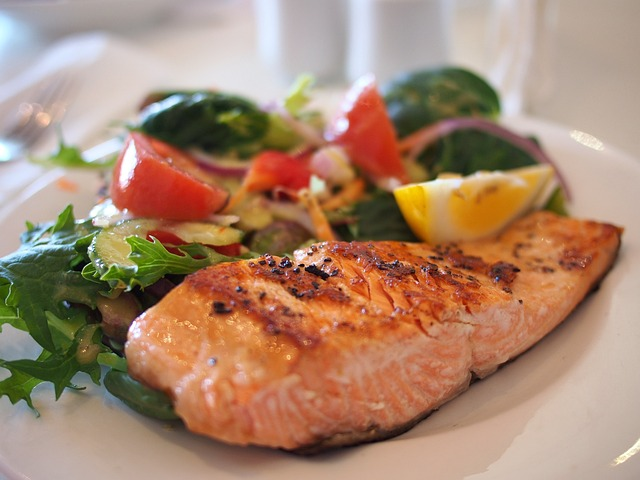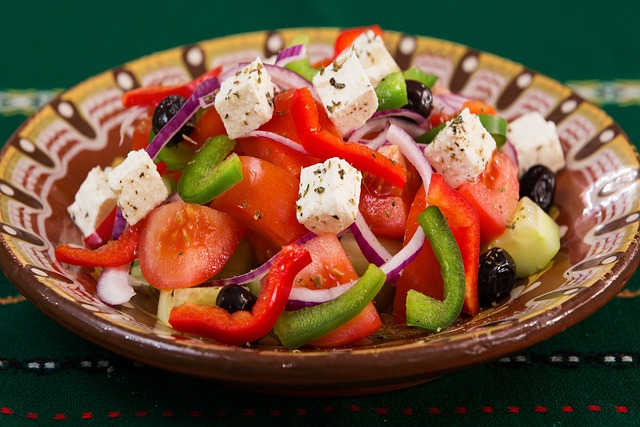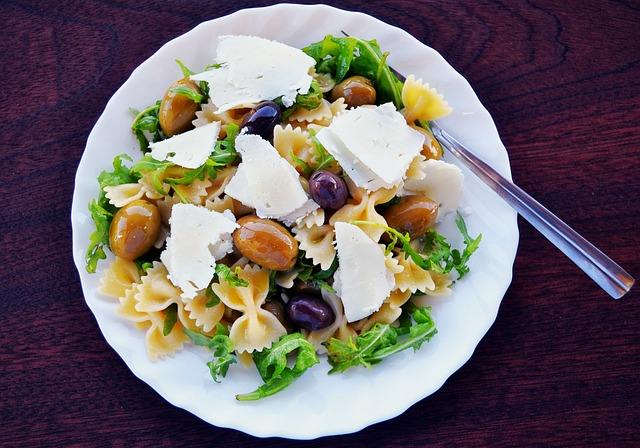Have you ever dreamt of eating delicious meals while reaping numerous lifestyle benefits? The Mediterranean diet example might just be the answer you’ve been searching for to help you start eating better! By the end of this blog post, you’ll understand this flavorful lifestyle and see an example 7 day Mediterranean diet meal plan to help kickstart your Mediterranean style diet.

- The Mediterranean diet is a delicious and nutritious lifestyle choice with positive health benefits.
- Enjoy the flavors of the Mediterranean diet by stocking your pantry, creating balanced meal plans, snacking smartly & dining responsibly.
- Celebrate with 7 days of flavorful meals for breakfast, lunch & dinner, plus snacks in between!
Table of Contents
Understanding the Mediterranean Diet

The Mediterranean diet offers an enjoyable way of consuming food. It’s based on traditional recipes from countries including France, Spain, Greece, and Italy, located on the Mediterranean Sea’s shores. With its key ingredients of fruits, vegetables, whole grains, and healthy fats, it’s no wonder the Mediterranean diet has been linked to numerous health benefits, including weight management.
Key Components
The key components of the Mediterranean diet focus on whole, unprocessed foods, such as whole grains, fruits, vegetables, legumes, nuts, seeds, and healthier fats like olive oil. Additionally, this diet emphasizes moderate fish, poultry, and dairy consumption while limiting red meat and processed foods.
The Mediterranean diet is also known for incorporating herbs and spices for flavor and encouraging the enjoyment of meals with family and friends.
Imagine a diet abundant in whole grains, fruits, vegetables, legumes, nuts, fish, poultry, and healthier fats, with moderate amounts of red meat, eggs, and fermented dairy. That is the diet most popular in the Mediterranean region! The key components provide a balanced diet full of essential nutrients and low in unhealthy fats without calorie counting. Alcohol consumption, specifically moderate intake of red wine, is allowed on the Mediterranean diet.
Health Benefits
Besides being utterly delicious, the Mediterranean diet offers remarkable health benefits like weight loss, enhanced heart health, better blood sugar regulation, and preservation of brain function.
With such a long list of advantages, it’s easy to see why this diet is becoming increasingly popular worldwide.
Building Your Mediterranean Diet Pantry

As you embark on your Mediterranean journey, building a pantry that supports your new lifestyle is essential. Focusing on fresh, whole foods packed with nutrition and flavor will set the foundation for your success.
Staple Foods
Your Mediterranean pantry should consist of staple foods like olive oil, whole grains, legumes, nuts, fish, poultry, and fresh produce.
Don’t forget the delicious canned and dried beans, frozen fruits and vegetables, and whole grains like oatmeal and quinoa found in the middle aisles of the grocery store.
Shopping Tips
Remember to buy fresh produce, seafood, whole grains, nuts, seeds, and extra virgin olive oil when shopping for the Mediterranean diet.
To make the most of your grocery shopping, plan your meals ahead of time, make a grocery list, and only visit the necessary aisles to get the food on your list.
Creating a Balanced Meal Plan

To ensure you reap the benefits of the Mediterranean diet, creating a balanced meal plan that incorporates meal planning basics and meal prep strategies is crucial.
Meal planning basics include understanding the importance of portion control, selecting nutrient-dense foods, and incorporating a variety of flavors and textures. Meal prep strategies involve planning meals before the time you’ll need them, including prepping, chopping, measuring ingredients in advance, and using leftover ingredients.
Meal Planning Basics
When planning your Mediterranean meals, focus on variety, eating in moderation, and making sure to include all food groups. This ensures you receive all the essential nutrients your body needs while enjoying the delightful flavors of Mediterranean cuisine.
Meal Prep Strategies
Meal prep is the key to success on the Mediterranean diet. Batch cooking, prepping ingredients ahead of time, and using leftovers are great strategies to make meal planning a breeze.
By preparing components ahead of time, you’ll save time and ensure you always have healthy and delicious meals at your fingertips.
A Week of Mediterranean Diet Meals

Now that you have a solid foundation let’s dive into a week of delicious Mediterranean diet meals. From breakfast to dinner and even snacks, we’ve got you covered with a variety of recipes that will tantalize your taste buds.
Start your day with a healthy breakfast of Greek yogurt with fresh fruit and nuts. Try a Mediterranean-style salad with feta cheese, olives, and tomatoes for lunch. For example, for the future.
Day One
Kickstart your Mediterranean journey with a delicious breakfast bowl, a flavorful roasted vegetable salad for lunch, and a succulent grilled salmon with lemon-garlic sauce for dinner.
These dishes are not only mouthwatering but also packed with nutrients to fuel your day.
Day Two
On day two, indulge in homemade granola for breakfast, a delectable Greek salmon salad for lunch, and a hearty Tuscan soup for dinner. These meals are sure to satisfy your cravings while keeping you on track with your Mediterranean diet goals.
Day Three
For day three, delight in za’atar eggs for breakfast, an avocado quinoa salad for lunch, and mouthwatering grilled scallops with Greek lemon rice for dinner.
These dishes showcase the Mediterranean diet’s versatility and the variety of flavors at your disposal.
Day Four
Day four brings oatmeal pancakes for breakfast, a Mediterranean tuna salad sandwich for lunch, and vegetarian eggplant rollatini for dinner. These meals prove that the Mediterranean diet is nothing but boring, offering a unique combination of flavors and textures to keep you coming back for more.
Day Five
On day five, enjoy Greek yogurt with fruit for breakfast, a Mediterranean salmon salad for lunch, and mushroom pasta with Shirazi salad for dinner. The combination of lean protein, fresh vegetables, and whole grains in these dishes provides a perfect balance of nutrients to keep you feeling satisfied and energized.
Day Six
Day six features a vegetable frittata for breakfast, smashed potatoes for lunch, and roasted vegetable chickpea bowls for dinner. These dishes offer a delightful mix of flavors, textures, and nutrients, showcasing the best of what the Mediterranean diet has to offer.
Day Seven
Finally, on day seven, treat yourself to a mezze brunch platter and steak or chicken with roasted vegetables for dinner. These dishes are a perfect way to end your week, combining the vibrant flavors of the Mediterranean with the comfort of a home-cooked meal.
Snacking on the Mediterranean Diet

Snacking on the Mediterranean diet can be both delicious and nutritious. From savory to sweet, there are plenty of options to satisfy your cravings while sticking to your healthy lifestyle.
The Mediterranean diet is known for its abundance of fresh fruits and vegetables, whole grains, legumes, nuts, and healthy fats. It also includes moderately.
Savory Snack Options
For savory snack options, consider hummus with fresh veggies, olives, nuts, and seeds. These snacks are not only tasty but also packed with nutrients, making them the perfect choice for a midday pick-me-up.
Sweet Snack Options
When it comes to sweet snack options, look no further than dark chocolate, dried fruit, and smoothies. These treats offer a touch of sweetness without sacrificing your health goals, allowing you to indulge without guilt.
Dining Out and Staying on Track

Navigating the world of dining out while sticking to the Mediterranean diet can be challenging, but with a few tips and tricks, you can enjoy your favorite restaurants without sacrificing your healthy lifestyle.
For starters, look for restaurants that offer a variety of Mediterranean-style dishes. Many restaurants now offer dishes that are inspired by the Mediterranean diet, such as grilled fish, roasted vegetables, and salads with olive oil-based dressings.
When ordering, ask questions.
Restaurant Choices
When dining out, opt for Mediterranean, Italian, and seafood restaurants, as these establishments typically offer healthier options that align with the Mediterranean diet.
By choosing restaurants that cater to your dietary needs, you’ll be able to enjoy a delicious meal without straying from your goals.
Navigating Social Gatherings
To stay on track at social gatherings, consider bringing your own dish, choosing healthier options, and limiting alcohol consumption. These strategies will help you enjoy the event while maintaining your commitment to the Mediterranean diet.
Summary
In conclusion, the Mediterranean diet offers a delicious and nutritious way to improve your overall health and well-being. By incorporating the key components, planning balanced meals, and utilizing meal prep strategies, you’ll be well on your way to embracing a healthier lifestyle. So why wait? Start your Mediterranean journey today and experience the incredible benefits this flavorful diet has to offer!
Frequently Asked Questions
What are examples of a Mediterranean diet?
Examples of a Mediterranean diet include eating plenty of plant-based foods like fruits, vegetables, nuts, seeds, legumes, and whole grains; adding healthy fats such as olive oil and avocados; using herbs and spices to flavor foods rather than salt; limiting processed and red meats; and enjoying fish and poultry at least twice a week.
Eating in moderation, with meals that are shared with family or friends, is also part of the Mediterranean lifestyle. Enjoying the Mediterranean diet can not only be delicious but also benefit your health!
What should you eat a week on the Mediterranean diet?
Eating a Mediterranean diet every week is easy and flavorful. You’ll get all the essential nutrients from whole grains, fruits, vegetables, beans, herbs, spices, nuts, and olive oil, and you’ll add in protein like fish and seafood twice a week, eggs, poultry, and dairy, and only enjoy red meat and sweets occasionally.
This diet is a great way to get the vitamins and minerals you need while also enjoying delicious meals. It’s also a great way to reduce your stress.
What are examples of a Mediterranean diet?
Following the Mediterranean diet can bring numerous benefits to your health and well-being. Examples of a Mediterranean diet include whole grains, legumes, fruits, vegetables, nuts, seeds, fish, healthy fats such as olive oil, moderate amounts of dairy, and red wine in moderation.
Eating this way helps ensure that you get enough fiber, healthy fats, and micronutrients while avoiding processed and unhealthy foods.
Are potatoes OK on Mediterranean diet?
Absolutely! You can enjoy potatoes in moderation as part of a Mediterranean diet. However, choose healthy cooking methods, such as baking or roasting, and limit portions.
Potatoes are an excellent source of vitamins and minerals, such as potassium, Vitamin B6, and Vitamin C. They also provide dietary fiber, complex carbohydrates, and protein. Fried or processed potatoes are high in calories and unhealthy fats and should be avoided on a Mediterranean diet.
